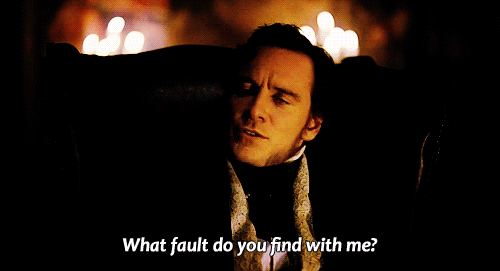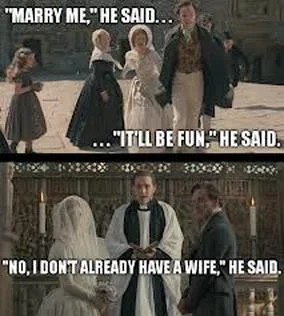Sorry Friends, Rochester Sucks
by ann pekata
There are, literally, so many, Rochest. SO. MANY.
There’s no witty, humorous, clever hook or anecdote to introduce this topic properly, so I’m just going to lay it flat: Rochester, the “heartthrob” of Jane Eyre, is not as romantic and swoon-worthy as many fans believe. I don’t want to go into too much detail, because there’s only so much I can put on a blog post, but trust me, I have enough passion to write a dissertation. Now, the following is entirely my opinion (backed up with what I think are cold hard facts) so you can feel free to disagree, but also like…just take a second. Think about it. And now? We’re taking Rochester to trial.
The First Offence. I’m going to start with the small stuff; we can save the really big elephants in the room for later. The first little action that would probably get Rochester thrown into The Bad Place is this: he’s a dick. He’s incredibly mean to Adele, his ward, and even mentions how he wonders why he even took her in. Does he bring her presents? Yes, but that’s more the action of someone who doesn’t know how to interact around kids and just wants them to go away than someone who genuinely cares about their interests. He doesn’t want Adele around, and it’s only when Jane says she wants Adele to come along with them that he shows her the slightest bit of enthusiasm. It’s you who adopted her, Rochester, start acting like her father. Don’t adopt a kid to then proceed to ignore them at practically every turn. It’s not nice.
The Second Offence. The most obvious one. HE HAS A WIFE THAT HE TOLD NO ONE ABOUT AND LOCKED IN AN ATTIC. Psychopathic implications aside, that’s a terrible thing to do. It’s cruel; it’s inhumane; and it doesn’t say a lot for Rochester’s mental stability. And when Rochester expresses any regret about the situation, it has nothing to do with Bertha. It’s all about him. He can’t get married again, he’s damned for life, look how he was cursed, Rochester whines to the people gathered in the attic. He didn’t get her help or send her away because he feared for his own reputation. Not once does Rochester feel for his wife; all of his sympathy is toward himself and how he can’t have what he wants.
This is all bad enough, but then he didn’t tell Jane about it. Sure, that’s one hell of an awkward conversation to have, but taking advantage of an innocent and naïve girl’s first feelings of romance? Not the smoothest move in the book. Rochester was so focused on himself and what would make himself happy, that he didn’t take into consideration anyone else’s feelings. Jane would be made into an adulteress, an “other woman,” against her will, and Rochester never spared a thought to that situation because he knew what he wanted and he wanted to have it, screw the consequences. Not the kind of selfless love I find myself dreaming about, if I’m being honest.
And now, the Third and Final (that I’m focusing on) Offence. Take away Adele and take away Bertha: let’s just focus on Rochester and Jane’s relationship. The first, is that it’s obviously an unequal power relationship. He’s her boss. No matter what, their relationship will never be on equal footing. Then there’s their personalities. Rochester is very bullheaded. The biggest issue I have with their relationship can be summed up with one scene: Jane, who is often commented on as being plain and not liking fancy things, says that she doesn’t want jewels and fancy clothes and to be dressed up like a doll and made into something she’s not. Rochester’s response to that? To take her dress and jewelry shopping, saying that she needs prettier clothes to wear.
Rochester doesn’t listen. He focuses on himself and how he sees the world, without pausing to consider others’ feelings. Rochester moved the wedding along at tremendous speed, despite making Jane uneasy, because he knew about this wife and wanted to make it “legal” before it was too late, knowing that he was in the wrong. Does he see Jane as a person, or does he see her as someone who seems to be the perfect wife, the perfect meek soul that Bertha clearly isn’t, the perfect person that Rochester can mold into someone to perfectly compliment him, and not the other way around?
In essence, friends, Jane, after being surrounded by only women for a solid ten years of her life, fell in love with the first man who paid her a pretty compliment. Their love was unequal, and it wasn’t based on a healthy, grounded, beginning. Rochester is a stubborn, quite nasty at times, spoiled, and bitter man. And the worst part? He doesn’t change. Rochester stays exactly the same throughout the novel. He ends the same man as he was in the beginning; there’s no extreme show of understanding, of showing that he realized he was wrong. And maybe it’s just me, but after reading Jane Eyre so many times for class I feel like I could quote it, but I’m quite tired of this man who pays Jane these compliments and expects the world of her and wants to give her a world that she neither wants nor fits into. Jane deserved better, and whether that was a life alone or with a different man (or woman, but maybe that’s a different essay), who’s to say. Either way, it wasn’t ending with a Rochester-who-was-blind-but-maybe-now-isn’t.
Ann Pekata

